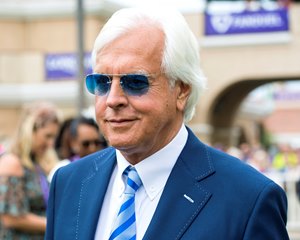Baffert Responds to Churchill Downs Motion to Dismiss


Bob Baffert's legal challenge to his two-year suspension from racing at tracks owned by Churchill Downs was filed about nine months after the inception of the ban. Now, close to the halfway point, the stage is almost set for a ruling.
On May 23, Baffert's attorneys filed a brief arguing that the track is so intertwined with state racing regulators that Churchill Downs' stay-away order amounts to state action; and that a complicated financing-tax incentive deal made between Churchill and the City of Louisville years ago declaring the track grounds a park means that Churchill cannot exclude Baffert without due process.
Baffert's legal team asked the court to accept a brief of 32 pages, which is seven pages more than usually allowed.
This follows Churchill Downs filing a motion to dismiss Baffert's lawsuit May 2, brought in U.S. District Court for the Western District of Kentucky, arguing that Churchill Downs, a private corporation, and individual defendants Bill Carstanjen and Alex Rankin were not required to extend Baffert a government-type due process notice and a right to be heard before making its decision.
Under court rules, Churchill Downs will be given time to file a reply to Baffert's response, at which time Churchill's motion to dismiss will be ripe for a decision by Judge Rebecca Grady Jennings.
In its motion to dismiss, Churchill, Carstanjen and Ranken argue that there are no allegations of state involvement in Churchill's decision to suspend Baffert from racing at its tracks; and that the decision does not infringe upon a constitutional right anyway since it does not prevent Baffert from racing at other tracks.
Suspensions by stewards, such as the 90-day suspension handed to Baffert after Medina Spirit tested positive for betamethasone after crossing the finish line first in the 2021 Kentucky Derby, are generally given reciprocity by other racing jurisdictions. Suspensions by private entities, such as the one being challenged in this case, are not. Churchill stated when it suspended Baffert its reasons went beyond the Medina Spirit case to a host of other medication infractions by the trainer.
In its brief, Churchill cited a 2016 Kentucky Supreme decision holding that horse racing at Churchill Downs was not transformed into a public function, thus justifying the application of due process standards, because it was extensively regulated by the government. Baffert's brief distinguishes what was at stake in that case as opposed to this one, but it does not address head-on the high court's ultimate finding.
Similarly, Churchill Downs cited law in its May 2 brief concerning Baffert's claim that a designation of the track grounds as a park transformed the corporation into an entity whose decisions are tagged with due process implications. A 2000 Sixth Circuit Court of Appeals decision says it is "well-established...that neither public funding nor private use of public property is enough to establish a close nexus between state and private actors." In that case, a state entity airport authority leased airport space to Delta Airlines. The court ruled Delta was not obligated to extend due process. Kentucky is in the federal Sixth Circuit.
In short, as to the due process claim, Churchill Downs argues that there is no evidence, and it says Baffert does not allege there is evidence, that the state or any state employee or agent told Churchill Downs to give the boot to Baffert.
Baffert's case was filed on Feb. 28. June 2 will mark the first anniversary of his suspension.
